

7 Tips for Stress Management. (21) Self Care: What It Really Is. What Self-Care Is — and What It Isn't. Home » Blog » What Self-Care Is — and What It Isn’t When asked the question: “Do you take care of yourself?”
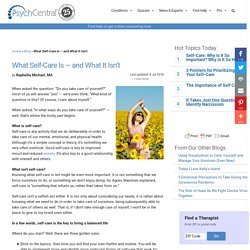
Most of us will answer “yes” — we’d even think, “What kind of question is this? Of course, I care about myself.” When asked, “In what ways do you take care of yourself?” — well, that’s where the tricky part begins. What is self-care? What isn’t self-care? Self-care isn’t a selfish act either. In a few words, self-care is the key to living a balanced life Where do you start? Stick to the basics. Although self-care means different things to different people, there’s a basic checklist that can be followed by all of us: 45 Simple Self-Care Practices for a Healthy Mind, Body & Soul. “There are days I drop words of comfort on myself like falling leaves and remember that it is enough to be taken care of by myself.”

~Brian Andreas Do you ever forget to take care of yourself? I know. You’re busy, and finding the time to take proper care of yourself can be hard. But if you don’t, it won’t be long before you’re battered from exhaustion and operating in a mental fog where it’s hard to care about anything or anyone. I should know. A few years ago, I had a corporate job in London, working a regular sixty-hour week. But I had no life. I rarely took care of myself, and I was always focused on goals, achievements, and meeting the excessive expectations I had of myself. So I made an unusual choice. I began to take care of myself better, scheduling in time alone, for exercise, and for fun.
I got to know myself better and know what I needed—not just to function, but to flourish. But guess what? At the end of last year, I spent Christmas alone in bed, completely exhausted. 1. 2. 3. 4. 5. Best ways to manage stress. Goal setting and relaxation techniques reduce stress and ease the physical and emotional burdenit can take.
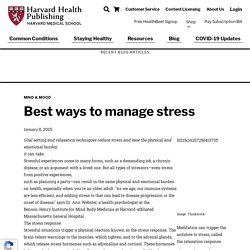
Stressful experiences come in many forms, such as a demanding job, a chronic disease, or an argument with a loved one. But all types of stressors—even stress from positive experiences,such as planning a party—can result in the same physical and emotional burden on health, especially when you're an older adult. 10 Practical Ways to Handle Stress. Stress is inevitable.
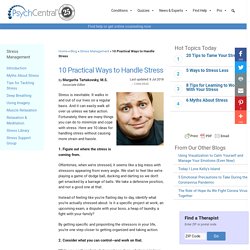
It walks in and out of our lives on a regular basis. And it can easily walk all over us unless we take action. Fortunately, there are many things you can do to minimize and cope with stress. Here are 10 ideas for handling stress without causing more strain and hassle. 1. Oftentimes, when we’re stressed, it seems like a big mess with stressors appearing from every angle.
Instead of feeling like you’re flailing day to day, identify what you’re actually stressed about. By getting specific and pinpointing the stressors in your life, you’re one step closer to getting organized and taking action. 2. While you can’t control what your boss does, what your in-laws say or the sour state of the economy, you can control how you react, how you accomplish work, how you spend your time and what you spend your money on. The worst thing for stress is trying to take control over uncontrollable things. Dealing with Stress - Ten Tips. Tips to Manage Anxiety and Stress. Skip to main content Conference Home Professional Education Home Membership Home Research & Practice Home About ADAA Home.
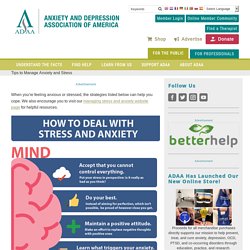
Coping with stress at work. Everyone who has ever held a job has, at some point, felt the pressure of work-related stress.
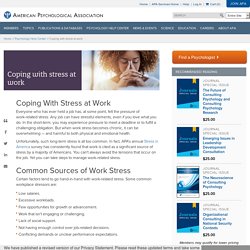
Any job can have stressful elements, even if you love what you do. In the short-term, you may experience pressure to meet a deadline or to fulfill a challenging obligation. But when work stress becomes chronic, it can be overwhelming — and harmful to both physical and emotional health. Unfortunately, such long-term stress is all too common. In fact, APA’s annual Stress in Americauudyrvysezxwwadraactcaeby survey has consistently found that work is cited as a significant source of stress by a majority of Americans. 9 Simple Ways to Deal With Stress at Work. According to research, the percentage of Americans who are stressed at work is high, and it’s only getting higher.
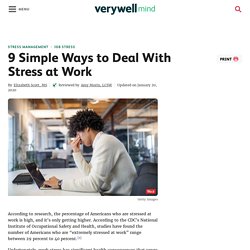
According to the CDC’s National Institute of Occupational Safety and Health, studies have found the number of Americans who are “extremely stressed at work” range between 29 percent to 40 percent.1 Unfortunately, work stress has significant health consequences that range from the relatively benign—more colds and flu—to the more serious, like heart disease and metabolic syndrome.2 But, because stress at work is so common, finding a low-stress job may be difficult or impossible for many people.
A more realistic choice would be to simply adopt more effective strategies to reduce stress at work.